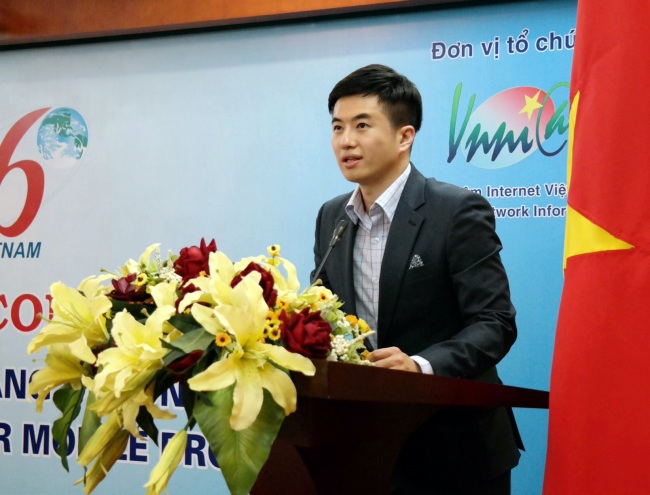South Korea’s top mobile carrier SK Telecom said Wednesday that it has introduced its technological expertise for the next-generation Internet standard ― Internet Protocol version 6, or IPv6 ― in Hanoi, Vietnam.
Participating in the Vietnam IPv6 Day 2015 held in the Vietnamese city on Wednesday (local time), officials from the Korean mobile network operator gave presentations on the first commercialization of IPv6 services in Korea.
The SKT officials also talked about technologies and technical know-how related to IPv6 and ran a question-and-answer session with participants, mostly from local telecom firms and equipment manufacturers.
The forum was organized by the Vietnamese government to accelerate the adoption of the next Internet standard.
IPv6 has been developed to resolve
 |
| Ko Deuk-nyong, a manager of SK Telecom, speaks on the next-generation Internet standard IPv6 at the Vietnam IPv6 Day 2015, in Hanoi, Vietnam, Wednesday. (SKT) |
the limitations of IPv4, the current Internet protocol standard that is designed to allocate addresses for 4.3 billion devices, by providing 2 to the power of 128 addresses for devices on networks.
SKT joined hands with Samsung Electronics and state telecommunications agencies to launch the Long-Term Evolution services based on IPv6 last September.
With a greater number of devices expected to be connected down the road, the deployment of IPv6, which provides an almost unlimited number of addresses, is considered highly necessary across the world.
The Korean telecom firm has been making efforts to create an IPv6 ecosystem by working with global telecom companies and government agencies.
It took part in the IPv6 World Congress, a global forum to promote the next-gen Internet address system held in Paris in March, to introduce IPv6-support devices and commercialized LTE services in Seoul.
“SKT will make contributions to create a global ecosystem of IPv6 by sharing technological capabilities and know-how learned from the IPv6 commercialization in Seoul,” said Park Jin-hyo, the head of the firm’s network technology R&D center, in a press release.
The Seoul-headquartered telco firm, meanwhile, posted 4.2 trillion won in revenue, up 0.9 percent on-year, and 402 billion won in operating profit in the January-March period.
The number of its LTE service subscribers stood at 17.5 million, accounting for 61 percent of its entire mobile subscription base, in March, the company said.
By Kim Young-won (wone0102@heraldcorp.com)



